Float pool - Study guides, Class notes & Summaries
Looking for the best study guides, study notes and summaries about Float pool? On this page you'll find 660 study documents about Float pool.
Page 4 out of 660 results
Sort by
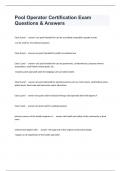
-
Pool Operator Certification Exam Questions & Answers
- Exam (elaborations) • 18 pages • 2024
-
- $10.99
- + learn more
Pool Operator Certification Exam Questions & Answers Class A pool - answer--any pool intended for use by accredited competitive aquatic events -can be used for recreational purposes Class B pool - answer-any pool intended for public recreational use Class C pool - answer--any pool intended for use by apartments, condominiums, property owners associations, multi-family owned pools, etc. -includes pools operated solely for lodgings such as hotels/motels Class D pool - answer-an...
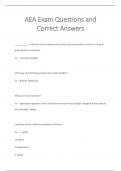
-
AEA Exam Questions and Correct Answers
- Exam (elaborations) • 66 pages • 2024
-
- $12.79
- + learn more
List 3 ideas that can help reduce instructor voice injury and enhance leadership skills Ans 1. incorporating hand and arm signals/ other nonverbal techniques 2. microphones 3. experiment with different teaching locations around the pool explain why it is generally recommended to exercise at mid- rib cage to mid-chest during shallow water programs Ans it reduces impact, allows for proper alignment, control of movement, and sufficient training of all the major muscle groups against waters...
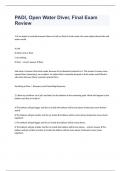
-
PADI, Open Water Diver Review Practice Questions 2024.
- Exam (elaborations) • 27 pages • 2024
- Available in package deal
-
- $13.49
- + learn more
PADI, Open Water Diver Review Practice Questions 2024.1) If an object is neutrally buoyant (does not sink or float) in fresh water, the same object placed into salt water would A sink. B either sink or float. C do nothing. D float. - correct answer D float. Salt water is heavier than fresh water because it has dissolved minerals in it. This means it causes more upward force (buoyancy) on an object. An object that is neutrally buoyant in fresh water would float in salt water because ther...
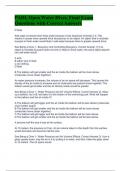
-
PADI, Open Water Diver, Final Exam Questions with Correct Answers
- Exam (elaborations) • 20 pages • 2024
- Available in package deal
-
- $13.99
- + learn more
D float. Salt water is heavier than fresh water because it has dissolved minerals in it. This means it causes more upward force (buoyancy) on an object. An object that is neutrally buoyant in fresh water would float in salt water because there is greater upward force. See Being a Diver I - Buoyancy and Controlling Buoyancy. Correct Answer 1) If an object is neutrally buoyant (does not sink or float) in fresh water, the same object placed into salt water would A sink. B either sink or ...
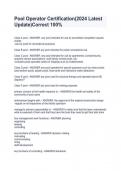
-
Pool Operator Certification(2024 Latest Update)Correct 100%
- Exam (elaborations) • 11 pages • 2024
- Available in package deal
-
- $12.99
- + learn more
Class A pool - ANSWER -any pool intended for use by accredited competitive aquatic events -can be used for recreational purposes Class B pool - ANSWER any pool intended for public recreational use Class C pool - ANSWER -any pool intended for use by apartments, condominiums, property owners associations, multi-family owned pools, etc. -includes pools operated solely for lodgings such as hotels/motels Class D pool - ANSWER any pool operated for special purposes such as vortex pools, san...
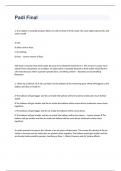
-
PADI FINAL EXAM 2024.
- Exam (elaborations) • 23 pages • 2024
- Available in package deal
-
- $11.99
- + learn more
PADI FINAL EXAM 2024. 1: If an object is neutrally buoyant (does not sink or float) in fresh water, the same object placed into salt water would A sink. B either sink or float. C do nothing. D float. - correct answer D float. Salt water is heavier than fresh water because it has dissolved minerals in it. This means it causes more upward force (buoyancy) on an object. An object that is neutrally buoyant in fresh water would float in salt water because there is greater upward force. See ...
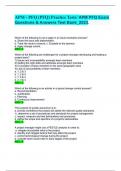
-
APM - PFQ (PFQ) Practice Tests/ APM PFQ Exam Questions & Answers Test Bank_2023.
- Summary • 59 pages • 2023
-
- $13.49
- 3x sold
- + learn more
APM - PFQ (PFQ) Practice Tests/ APM PFQ Exam Questions & Answers Test Bank_2023. Which of the following is not a stage in an issue resolution process? a. Share the issue with stakeholders. b. Track the issue to closure. c. Escalate to the sponsor. d. Apply change control. Which of the following are challenges for a project manager developing and leading a project team? 1) Issues and incompatibility amongst team members 2) Getting the right skills and attributes amongst team me...
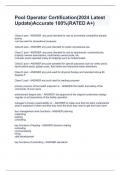
-
Pool Operator Certification(2024 Latest Update)Accurate 100%(RATED A+)
- Exam (elaborations) • 11 pages • 2024
- Available in package deal
-
- $10.99
- + learn more
Pool Operator Certification(2024 Latest Update)Accurate 100%(RATED A+) Class A pool - ANSWER -any pool intended for use by accredited competitive aquatic events -can be used for recreational purposes Class B pool - ANSWER any pool intended for public recreational use Class C pool - ANSWER -any pool intended for use by apartments, condominiums, property owners associations, multi-family owned pools, etc. -includes pools operated solely for lodgings such as hotels/motels Class D po...
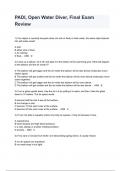
-
PADI, Open Water Diver, Final Exam Review Questions And Answers
- Exam (elaborations) • 13 pages • 2024
- Available in package deal
-
- $13.99
- + learn more
PADI, Open Water Diver, Final Exam Review Questions And Answers 1) If an object is neutrally buoyant (does not sink or float) in fresh water, the same object placed into salt water would A sink. B either sink or float. C do nothing. D float. - ANS D 2) I blow up a balloon, tie it off, and take it to the bottom of the swimming pool. What will happen to the balloon and the air inside it? A The balloon will get bigger and the air inside the balloon will be less dense (molecules mov...
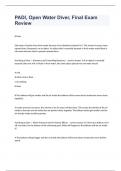
-
PADI, Open Water Diver, Final Exam Questions & Answers 2024.
- Exam (elaborations) • 27 pages • 2024
- Available in package deal
-
- $11.99
- + learn more
PADI, Open Water Diver, Final Exam Questions & Answers 2024. D float. Salt water is heavier than fresh water because it has dissolved minerals in it. This means it causes more upward force (buoyancy) on an object. An object that is neutrally buoyant in fresh water would float in salt water because there is greater upward force. See Being a Diver I - Buoyancy and Controlling Buoyancy. - correct answer 1) If an object is neutrally buoyant (does not sink or float) in fresh water, the same o...

How did he do that? By selling his study resources on Stuvia. Try it yourself! Discover all about earning on Stuvia


